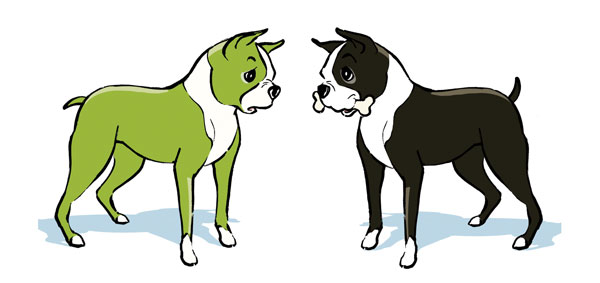Are dogs (and chimps) really inequity-averse?
In a recent article, New-York Times op-ed columnist Gail Collins reports on an experiment published in PNAS about a sense of fairness among dogs.
“Folks at the University of Vienna conducted a test in which dogs were asked to shake hands over and over and over again. If you have any experience with dogs, you will not be surprised to hear that they were absolutely delighted. And they didn’t care about being paid! The opportunity to perform the same trick endlessly with a stranger in a white coat was reward enough. Then the researchers brought in new dogs that were given a piece of bread as a reward for every handshake. The uncompensated dogs watched, lost their innate love of mindless repetition and grew sullen.”
Collins then draws a parallel between dog’s reactions to unfairness and the American’s reactions to the plan in favour of the auto industry.

We all like making connections between animals and humans. It seems that the closer animals are to humans, the easier it will be to explain the human phenomenon. But it may not help social and cognitive scientists to go too far too fast.
Five years ago, Brosnan and de Waal did a similar experiment with capuchins and then chimps. They showed that capuchins and chimps refuse a reward if another individual gets more for the same task. However, this does not show that monkeys are averse to inequity, only that they reject a lesser reward when better rewards are available (see also here). It can also be frustration or envy or even discouragement? Indeed, in an interview, Friederike Range, one of the authors of the dog study, noticed: “They get so mad that they look at you and just don’t give you the paw anymore”.
Moreover, all these studies share the assumption that “One crucial element for the evolution of cooperation may be the sensitivity to others’ efforts and payoffs compared with one’s own costs and gains” (Range et al.). However, although they hunt collectively, neither dogs nor chimps seem to take into account individual contributions to the hunt when sharing meat. There is also evidence that chimps don’t care about other’s welfare, (see here). One is then left with the following conclusion: Apes, monkeys and dogs do have a sense of fairness – and would never use it in the wild!
(PS : After having written this post, I just discovered that Brauer, Call and Tomasello failed to replicate Brosnan and de Waal’s original finding, even with an improved methodology).


No comments yet